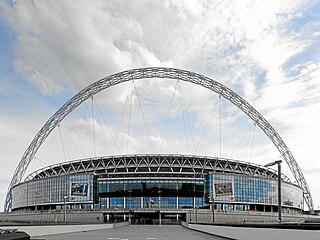Related Research Articles
David James Webb is an English former professional footballer who made 555 appearances in the Football League playing for Leyton Orient, Southampton, Chelsea, Queens Park Rangers, Leicester City, Derby County, AFC Bournemouth and Torquay United. He became a manager, taking charge of Bournemouth, Torquay United, Southend United, Chelsea, Brentford and Yeovil Town.
Robert James Hatton is an English former footballer who played as a centre forward. He played more than 600 matches in the Football League for a variety of clubs and scored at a rate better than one goal in every three matches.

Luke Horace Guttridge is an English former professional footballer who played as a midfielder. He previously played for Torquay United, Cambridge United, Southend United, Leyton Orient, Colchester United, Northampton Town, Aldershot Town, Luton Town and Dagenham & Redbridge. He amassed more than 400 appearances in the Football League.
Alan McCormack is an Irish football coach and former professional player who played as a right-back or midfielder. He is a coach at EFL League One club Leyton Orient.

Leon Charles Constantine is an English former footballer who played as a striker. A journeyman of lower league English football, he had 21 separate spells at 19 different clubs within the space of just 12 years. A latecomer to the professional game, he found a Football League club at age 22 and was a regular first-team player for the first time at age 23.

Ryan Anthony Cresswell is an ex-English professional footballer who is the manager for Matlock Town.
The 1992–93 season was the 94th completed season of the Football League.
The 1997–98 Football League was the 99th completed season of The Football League.
The 1999–2000 Football League was the 101st completed season of The Football League.
The 1927–28 Torquay United F.C. season was Torquay United's first season in the Football League and their first season in Third Division South. The season runs from 1 July 1927 to 30 June 1928.
The 1928–29 Torquay United F.C. season was Torquay United's second season in the Football League and their second consecutive season in Third Division South. The season runs from 1 July 1928 to 30 June 1929.
The 1929–30 Torquay United F.C. season was Torquay United's third season in the Football League and their third consecutive season in Third Division South. The season runs from 1 July 1929 to 30 June 1930.
Geoffrey Cox was an English professional footballer who scored 65 goals in 296 appearances in the Football League playing for Birmingham City and Torquay United.
Henry William Lane was an English professional footballer who scored 74 goals in 271 appearances in the Football League playing for Birmingham, Southend United and Plymouth Argyle.

Ernest Thomas Watkins was an English professional footballer who scored 87 goals from 202 appearances in the Football League playing for Birmingham, Southend United, Brentford, Millwall, Fulham, Gillingham and Charlton Athletic.
Danis Mahmut Mehmet Salman, sometimes known as Danny Salman, is an English former professional football player and coach, best remembered for his time as a defender in the Football League with Brentford. He made over 380 appearances for the Bees, is the club's youngest-ever league debutant and was inducted into the club's Hall of Fame. He also played for Millwall, Plymouth Argyle and Torquay United. Born in Cyprus, he represented England at youth level.
The 1930–31 Torquay United F.C. season was Torquay United's fourth season in the Football League and their fourth consecutive season in Third Division South. The season runs from 1 July 1930 to 30 June 1931.
The 1932–33 Torquay United F.C. season was Torquay United's sixth season in the Football League and their sixth consecutive season in Third Division South. The season runs from 1 July 1932 to 30 June 1933.

The 2012 Football League Two play-off final was an association football match played on 27 May 2012 at Wembley Stadium, London, between Cheltenham Town and Crewe Alexandra. The match determined the fourth and final team to gain promotion from Football League Two, English football's fourth tier, to Football League One. The top three teams of the 2011–12 Football League Two season gained automatic promotion to League One, while those placed from fourth to seventh in the table took part in play-off semi-finals; the winners of these semi-finals competed for the final place for the 2012–13 season in League One. Cheltenham Town finished in sixth place while Crewe Alexandra ended the season in seventh position. Southend United and Torquay United were the losing semi-finalists, being defeated by Crewe and Cheltenham respectively.
The 1931–32 season was the 31st season of competitive football played by Cardiff City F.C. It was the team's first season in the Third Division South of the Football League since being relegated from the Second Division during the previous season.
References
- 1 2 3 "Steve Phillips". Barry Hugman's Footballers. Retrieved 19 October 2015.
- ↑ Dunk, Peter, ed. (1987). Rothmans Football Yearbook 1987–88. London: Queen Anne Press. p. 314. ISBN 978-0-356-14354-5.
- ↑ "Match results under 18 1971–1980". England Football Online. Chris Goodwin & Glen Isherwood. 2 October 2024. Retrieved 12 October 2024.
- 1 2 3 "Steve Phillips". UK A–Z Transfers. Neil Brown. Retrieved 12 January 2009.
- 1 2 3 4 Matthews, Tony (1995). Birmingham City: A Complete Record. Derby: Breedon Books. p. 117. ISBN 978-1-85983-010-9.
- 1 2 Matthews, p. 207.
- ↑ Tattum, Colin (27 August 2008). "Jordon Mutch becomes Birmingham City's second youngest debutant". Birmingham Mail. Retrieved 21 August 2015.
- ↑ Matthews, pp. 208–09.
- ↑ Ross, James M. (7 November 2008). "English League Leading Goalscorers". RSSSF . Retrieved 8 June 2009.
- 1 2 "Steve Phillips inducted in to Hall of Fame". www.brentfordfc.com. Retrieved 4 May 2019.
- ↑ Miles, Peter & Goody, Dave (2008). The Southend United Miscellany. Hockley, Essex: Shrimper Publishing. p. 30. ISBN 978-0-9555976-2-6.
- ↑ Miles & Goody, p. 62.
- ↑ "Season 1982–83 Football League Division 3" , "Season 1983–84 Canon League Division 3" and "Season 1984–85 Canon League Division 4". Southend United Database. Retrieved 12 January 2009.
- ↑ "Steve Phillips". Southend United Database. Retrieved 12 January 2009.
- ↑ Waiters, Tony. "Little Stevie Wonder". World of Soccer. Archived from the original on 18 July 2011. Retrieved 24 April 2009.
- ↑ Jordan, Antony & Garin, Erik (1 February 2004). "UEFA Youth Tournament Under 18, 1973". RSSSF . Retrieved 8 June 2009.
- ↑ "Welcome". Inchy's Bar website. Archived from the original on 7 September 2008. Retrieved 11 January 2009.
- ↑ "Where Are They Now? Northampton Town 1975–76 Division Four Runners Up". The League Paper. 13 November 2013. Retrieved 21 August 2015.